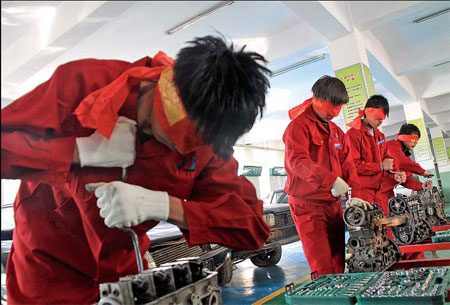Help to vocational schools aids students
Updated: 2012-02-28 09:31
By Luo Wangshu and Zheng Xin (China Daily)
|
|||||||||||
BEIJING - The government is considering providing more subsidies to poor students at vocational schools in order to meet the country's rising demand for qualified technical workers, an educational official said.
|
 |
|
Students compete in the skills needed to handle a machine with their eyes covered at the No 2 Vocational School of Jinan, Shandong province, on Feb 18. [Photo/China Daily] |
"We aim to allocate more money to support vocational schools, to spare more poor students the burden of tuition," Zhang Guangming, director of the China National Center for Student Assistance Administration, told China Daily.
There are 3.95 million vocational school students with family financial difficulties who benefited from the tuition-free policy in 2011, which accounted for 20 percent of enrolled students in the vocational sector in China. Exempted tuition fees amounted to as much as 7.9 billion yuan ($1.25 billion), according to Zhang.
"Policy on subsidizing students with financial difficulties in vocational schools has improved in 2010 and 2011," Zhang said.
"In 2010, we provided our tuition-free benefit policy to poor students from cities, not just to ones from rural areas," Zhang added.
In addition, many students benefited from State grants. More than 9 million students received grants of 13.6 billion yuan in 2011.
"I hope that more students can receive one more level of education after graduating from middle school and not be rushed into work, regardless of their family financial situation," Zhang added.
"As a big manufacturing country, we need more qualified workers."
Zhang said, "We have done well in the past. Chinese workers have a good reputation. At least they are literate, as a result of the rapid development of nine-year compulsory education and vocational education."
Liu Bing, 28, a former worker from Henan province who waxed cars in South Korea from 2002 to 2006, received vocational education before going abroad.
"Vocational schools taught me basic foreign-language and other skills, which allowed me to work in South Korea," said Liu. He is now a successful owner of an interior decorating company for apartments and he lives in a townhouse.
Tashi Yongdu, a 16-year-old vocational school student from the Garze Tibetan autonomous prefecture in Sichuan province, who currently studies in Chengdu, capital of Sichuan, has received full financial aid and tuition free from the State since 2010.
"I never imagined that I could go back to school," Tashi said. As the only boy in a divorced family, Tashi's family couldn't afford his tuition after junior high school. His mom's salary was the only income for the family of four.
"I didn't want my mom to live a life this hard," Tashi said. So he simply dropped out after finishing his junior middle school and thought he would take on some family chores for mom on the plateau, or pack a bag and head off to earn his living in the outside world.
However, during summer vacation in 2010, right after Tashi graduated from middle school, he was told that he had a chance to go back to school again with funding from a national vocational school. The funding paid for his tuition and gave him 300 yuan per month to live on.
"This is definitely a milestone in my life," Tashi said. Now he is in his second year at the vocational school and he wants to take his mom out of his hometown to see the big cities when he is able to earn a salary.
Tashi is one of 225 Tibetan students who received full subsidy at Chengdu Zhonghe Vocational School. "Every student in our school receives financial subsidies," said Peng Yong, head of the educational affairs division of the school. "About 30 percent of them are taking the tuition-free subsidy for poor students."
Xiong Bingqi, deputy director of the 21st Century Education Research Institute, a non-governmental organization, said: "Relevant authorities have paid much attention to subsidizing students from vocational schools in recent years. But a few schools and local education departments made up a student list to cheat more money from the government."
Xiong also told China Daily that State authorities had distributed banking cards to individual students to avoid cheating but still needed public monitoring to stop the fraud.
Giving out money to each individual and not to the schools and local education departments would be an effective way to benefit students, Xiong said.
Related Stories
China nears annual enrollment goal for vocational schools 2010-11-26 21:33
High employment rate for vocational graduates 2011-06-24 09:07
ASEM Symposium on Technical and Vocational Education held in Qingdao 2011-01-14 17:01
Prepare skills for future 2011-03-17 08:01
Young campers get taste of military life 2011-07-25 14:25
- Li promises stable growth
- Investment in China's cement industry falls
- Home sales in Beijing rebound
- Poly Real Estate to increase land bank
- China mulls new green production laws
- China may launch rate cuts in Q2: report
- Beijing-Benz: Five-fold surge in production
- The new software that's animating industries








